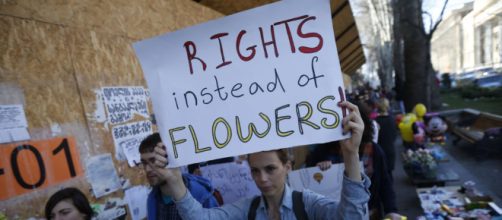People across the world celebrated International Women's Day. From London to New York, right across the globe to cities in Africa, South America, and Asia, people gathered to celebrate women's achievements and highlighted still existing Gender Inequality.
Last year, both the #metoo campaign as well as the gender pay gap reignited the debate surrounding women's rights. Although women in many societies enjoy considerable freedoms and a level of equality, they still have a long way to travel before achieving full #equality.
How women celebrated IWD across the globe
Apart from well-publicised events in the world's main cities, people marked International Women's Day at small, local events right across the world. In Lagos, Nigeria, women took part in the Product Owner Masterplan, held at the African Fashion Development and Empowerment Centre and #pressforprogress.
Also under the same heading, organisers in Dubai invited 100 artists from 100 countries to exhibit their works of art in celebration of IWD 2018.
Women from cities across the world contributed to the IWD PaintJam, again to #pressforprogress.
In many countries, #women downed tools to mark IWD with #womenstrike. This is what the offices at El Pais, the Spanish newspaper, looked like on International Women's Day.
En la redacción de EL PAÍS, hoy no estamos todos #LasPeriodistasParamos #Huelga8Marzo #WomensDay https://t.co/Ku1A43HyXY pic.twitter.com/mcbSkjcMKK
— EL PAÍS (@el_pais) March 8, 2018
In India, women took to the streets of all the major cities to draw attention to still existing #gender inequality. The IWD flag flew over the houses of parliament in London for the first time. More than 100 MPs from across the political spectrum wrote to Amber Rudd, demanding access to abortion for women in Northern Ireland, rather than having them travel to England.
In Rome, women gathered to protest against #gender inequality in the Catholic church. Mary McAleese, the former president of Ireland, called the church "an empire of misogyny".
Mary McAleese says women aren't 'mysteries' or 'strawberries on the cake', despite what popes have called them https://t.co/OUpKn7ousB #IWD2018
— TheJournal.ie (@thejournal_ie) March 8, 2018
In the Philippines, protesters wore pink and purple shirts to protest against the country's president, whom they consider a strong violator of women's rights. In Pakistan, where serious rights violations are common ground, women gathered for protests in Islamabad, Karachi, and Lahore.
Serious violations of women's rights continue
As much as there is to celebrate about the contributions and achievements of #women, millions of them still endure serious violations of their rights. Apart from the well-highlighted sexual harassment and pay gap issues, other numbers are even starker.
According to Girls Not Brides, worldwide, 12 million girls under 18 are forced into marriage each year, that's one nearly every second. Female genital mutilation is still prevalent in many countries. The WHO estimates that 200 million girls in 30 different countries have been cut. UN Women statistics show that 1 in 3 #women have experienced sexual or physical violence. An ITV news report highlighted that 1 in 7 girls cannot afford to buy sanitary products.
One in seven girls in the UK struggle to afford sanitary products, with some even missing school as they are unable leave home during their periods. Now, one Welsh council plans to hand products out for free to tackle 'period poverty'. https://t.co/VmWCdDJm04 pic.twitter.com/rpphtRhQG5
— ITV Wales News (@ITVWales) March 6, 2018
These figures underline the urgent need to #pressforprogress.
Harnessing the momentum of #metoo and #pressforprogress
The growing momentum to push for more #equality is palpable right across the globe, online, in the media, and in professional settings. Whereas up until quite recently, many women may have felt much had been achieved, #women now feel the need to protest, seek change, and demand true #equality.
Happy International #WomensDay! #TimeIsNow to support each other, believe in each other & encourage each other to speak up for rights & gender equality! https://t.co/Non0GlY9S5 #IWD2018 pic.twitter.com/kJJ0zBF1Oy
— UN Women (@UN_Women) March 8, 2018


